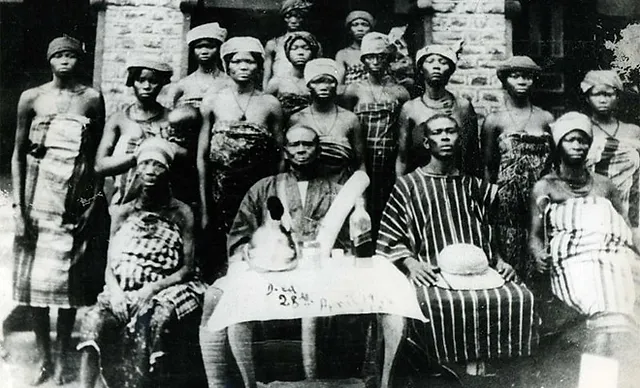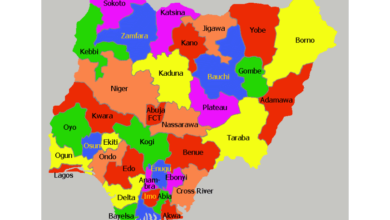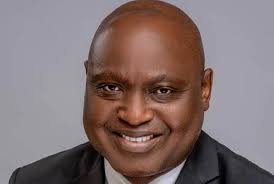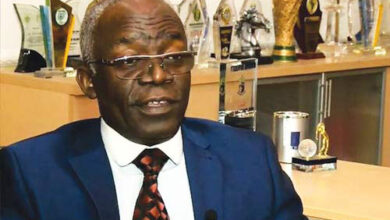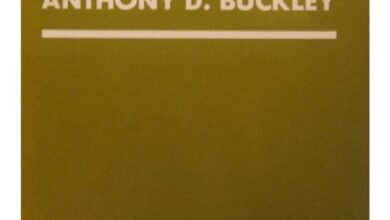Chief Imam Muhammed Lawal Basil Agusto QC:

A Jurist of Distinction, Master-Theologian and Bridge-Builder
The focus of this chapter is an assessment of the role and place of Muhammed Lawal Basil Agusto in the history of Islam in contemporary Lagos society. M.L.B. Agusto came from a prominent Brazilian family. Basil’s father was Senghor Abubakar Joao Agusto, alias “Taiyese,” while his mother was Ajoke Aneedu.
The Agusto family settled at Bamgbose, Popo Aguda, between 1840 and 1847 following the abolition of slave trade. The family, like the Salvador, Yahya Tokunboh, Tiamiyu, Martin, Gomez, Da Silva and Pedro families, is a strong Muslim family. The Brazilians, in fact, erected their own mosques such as Olosun Mosque, Alagbayun Mosque at Taiwo Street, Tairu Eko Mosque and Salvador Mosque. However, the preponderant majority of Brazilians were Catholics.
Thus, the Brazilians were heirs to two heritages: Islam and Catholicism.
The Career of Basil Agusto:
Basil Agusto was born in 1880. Unlike many young Muslims of his generation who were denied admission into mission schools, he received his secondary education at St. Gregory’s College. He secured the admission partly because of his academic brilliance but most importantly because his father wielded enormous influence with the Catholics. On completion of his secondary education, Agusto took up part-time employment as a teacher at Muslim Secondary School with a view to contributing to the educational progress of Muslims.
Teaching was, however, not Agusto’s primary interest. His initial career choice was pharmacy. He thus enrolled at the School of Pharmacy, Lagos, where Dr. Oguntola Sapara was one of the teachers. It is said that Dr. Sapara took very active interest in him because of the strength of his character, his academic acumen and religious devotion. L.B. Agusto subsequently became a qualified pharmacist and one of the most successful of his era.
No doubt, Agusto’s devotion and commitment to Islam was serious. The first outlet for his boundless religious zeal was his leadership of the Muslim Literary Society, a Muslim youth organization poised for the reforms and advancement of Islam. Agusto was not only one of the founding fathers of this society, his house at No. 63, Bamgbose Street, Lagos, was venue for its meetings. Other notable founding members included B.A. Fanimokun, A.R.A. Smith, B.A. Disu, A.B.O. Agbabiaka and H.A. Subair.
More importantly, Imam Agusto played a pivotal role in the establishment of a modern reformist/revivalist movement, the Ahmadiyyah Movement. It has also been canvassed in several literature that it was Agusto’s contact with the publication of Islamic Review via Dr. Sapara that provided the ideas that germinated in the founding of the Ahmadiyyah.
The Ahmadiyyah Movement came into a formal existence in 1916 with a constitution that provided for the post of Chairman. The chairman at its inception was Alfa Adam Idowu Yaqub, while L.B. Agusto was the Vice-Chairman. The foundation Executive also comprised Jibril Martin, B.A. Fanimokun (the Financial Secretary), and Muhammed Jumat Selem. The first Imam was Alfa Kasumu Rufai Ajose. However, when the constitution was amended by which L.B. Agusto became the first president of the movement. He served as the president until 1920 when he left for London to pursue a first degree in law.
The question has often been asked: Why should a distinguished pharmacist opt for law? The answers are not far to seek. First, law was the ultimate profession in the colonial era (especially between the 1920s and 1950s), while lawyers also occupied the pride of place in every facet of life. Secondly, it was the practice then for people who had distinguished themselves in their primary vocations to later study law to enrich their knowledge and life. Thus, Adebesin Folarin was already successful trader, with extensive trading network all over Nigeria and as far as the Congo Republic (Kinshasa), before venturing to read law. Similarly, N.M. Holm, father of Percy W. Holm was “the best known native photographer” in Lagos before he went to study law in 1914.
What is, however, of major importance to us at this point is that Agusto completed his legal education in 1923 and was called to the bar in 1924. He returned to Nigeria in 1924 as the first Muslim lawyer. In the context of the history of legal profession and also in terms of achievements by Muslims of Agusto’s time, his qualification as a lawyer was a significant landmark. More so, when it is considered that the Christian counterparts had been producing qualified legal practitioners since 1879 – the likes of Sapara Williams, Joseph Egerton Shyngle, Kitoyi Ajasa, Gabriel Savage, A.J.E. Bucknor, Eric Moore, Rotimi Alade, Edward Vincent, Clarke Horace, Samuel Davies, among others.
Agusto became the 74th Lawyer in
Nigeria and the 1st Muslim Lawyer.
Another issue of importance worth considering about Agusto was that his stay in London between 1920 and 1924 radically affected his conception of and attitude to the Ahmadiyya Movement-in-Islam.
In London, he discovered that there were two groups of followers of Azra Ghullam Ahmad, the spiritual leader and founder of the Ahmadiyya movement. The first group, Amadiyyah-Movement-in-Islam upheld the belief that Ghullam Ahmad was only Mujadeed (reformer), while the other group, Ahmadiyyah Sadr Anjuman subscribed to the view that Ghullam Ahmad was a prophet and Mahdi. Eventually, Agusto broke away from the Ahmadiyyah of any sort because it conflicted with the Quranic provision which stipulates that the Quran “is the final and unchangeable revelation of the will of Allah” while Prophet Muhammed is the seal of the prophets.
On Agusto’s return to Nigeria in 1924, he brought the new development to the attention of the broad spectrum of Ahmadiyyah-Movement-in-Islam and made strenuous efforts at convincing the members to reconsider their steps.
However, when the overwhelming majority stuck to their guns, Agusto’s bade farewell to the movement and went ahead to establish another Muslim organization-the Islamic Society of Nigeria. This stance, no doubt, brings to the fore Agusto’s strength of character and leadership style. A.K. Laguda comments thus:
For a leader to say he was wrong yesterday shows that such a leader is a great man. That was what Mr. L.B. Agusto did when he broke away from the Ahmadiyyah Movement.
It is significant to note that the decision which Agusto took in 1924 and which many others could not take then eventually led to doctrinal controversy of enormous proportion between the 1940s and early 1970s. In fact, it was only in May 1974 that the Ahmadiyyah Movement in Islam Changed to Anwar-ul-Islam Movement of Nigeria. In short, Agusto’s preaching of the finality of the prophet and rejection of the claim of prophethood of Ghullam Ahmad, was now accepted 50 years later by his erstwhile followers.
We can now consider Agusto’s College, Lagos and London School of Accountancy and a co-founder of the National Bank of Nigeria. Other members of Agusto’s Executive were Mr. Boonyamin Gbajabiamila, the general-Secretary, Alfa M.K. Ekemode, the Chief Missioner. In later years, A.K. Laguda worked with Agusto as the General Secretary. Other eminent Muslims in the fold of the Islamic Society of Nigeria were M.O. Oseni, A. Fashola, I.A. Thanni, Y.A. Kekere-Ekun, Alfa R.A.B. Jose, A.T. Ariori, T.M. Asuni, A.T. Giwa, M.A. Iginla, T.A. Timson, Alhaji L.A Finni, and Dr. A.H.S. Tinubu, the first Muslim medical doctor, among others.
As the pre-eminent leader of the Islamic Society of Nigera, Agusto was a great source of inspiration to many young Muslims, particularly the educated ones, for they saw in him a rare combination of Muslim theologian and jurist, a man whose acceptance of Western education did not impede his practice of Islam and who, in fact, could match the most ardent Christian evangelist and ideologist every inch and at any level. It was his practice then to visit selected schools on the invitation of Muslim students to educate them on the ideals of and values in Islam. Saburi Biobaku preserves Agusto for us in these telling words:
…The Islamic Society of Nigeria was then elitist, striving to practice Islam in a way acceptable to the educated, with the advantage of the distinguished leadership of Lawyer L.B. Agusto, its Chief Imam. Naturally my choice fell upon the Islamic Society of Nigeria and I went back to the Chief Imam to let him know that I wished to join the Society. Thus began an association which ripened into my being accepted as a friend of the family. The Chief Imam was an impressive leader, though a lawyer, he would, every evening, sit outside his house, then at 62 Bamgbose Street, read the Holy Quran and instruct his visitor on the religion. I would sit at his feet, marveling at his command of Arabic language and his astonishing devotion to the cause of Islam. Soon, we struck up an arrangement whereby the Chief Imam came out once a week to lecture us, the Moslem students at (Yaba) Higher College, without demanding any remuneration. We were stimulated by him and he himself was pleased to be in the company of young educated Muslims, instructing us and debating with us. He introduced us to the Islamic Review a periodical which he received regularly from England. We were encouraged to visit his home in Lagos. My friend Olumbe Bassir and I would go there on Fridays and accompany him from the house to the Islamic Society’s praying ground at Campos Square. He was usually a resplendent figure in his well-tailored suit and gold-guard, with a fez cap as he led us on foot to the Campos Square praying ground. He would deliver a beautiful Khutbat (sermon) in English after which he would lead us in prayers and later lead us back in a procession to his home, here Bassir and I usually spent our “Sallah” days.
Indeed, in the late 1960s, Imam Agusto engaged in polemical debates with the cream of the Christian elite, particularly Rev. Forster and Bishop Adelakun Howells on such issues as the concept of the God-head, the nature of virgin birth, the status of Muhammad, the institution of polygamy, the use of charms, mode of worship, among others. According to G.O. Gbadamosi and J.F. Ade Ajayi, the open-air debates lasted for over a year and provoked prolonged theological discussions.
Another area in which the relevance of Imam Agusto can be measured lies in his input into the formation of a pan-Nigeria Islamic organization. By the account of A.K. Laguda, we now know that L.B. Agusto was seriously concerned with the issue of fostering unity among Muslim organizations in Nigeria so that they could always present a common front on most issues affecting the Muslim community or presented a united front against policies and intuitions that could be inimical to the progress of Islam. Laguda also informs us about the strenuous effort of Agusto and his (himself) at establishing an All-Nigeria Muslim Council and the forces that eventually stifled it.
The umbrella organization canvassing for that unity had Agusto as the protem-President and A.K. Laguda as the protem-Secretary.
It is also on record that the education progress of the Nigerian Muslim was of serious concern to Imam Agusto. He founded and ran a Muslim secondary School which failed to make it because of the Education Code of the day. The Jamat of which he was the Chief Imam and missioner till death was very active in the establishment of primary and secondary schools in Lagos before the government take-over of schools in 1976.
Beyond education, Imam Agusto was also involved in the struggle for the creation of Lagos State.
In fact, he and Dr. T.A. Doherty led “a Committee of Elders” for the creation of Lagos State. This committee, in 1967, increased the tempo of agitation for state creation and also passed a resolution which, among other things, called on the Federal Military Government “to create a Lagos State by decree without further delay.”
In summary, Imam Agusto was a devout Muslim, a jurist of distinction, a theologian of repute and a religious reformer. He was highly committed to the educational advancement of Muslims and he always stood in defence of Muslim rights while at the same time, defending the religion against Christian onslaught. No doubt, he worked assiduously for the progress of Islam and the upliftment of Muslims. He was a toast to and pride of the Muslim community. He gave the community hope, respect and dignity. He was also a lover of Lagos State and its peoples,
Imam Agusto died on July 26, 1971.
A very succinct assessment of the historical significance of Imam Agusto has been provided by Prof. A.B. Fafunwa:
Imam Agusto was a rare gift to the Lagos Muslim community and was esteemed and revered long after his death. He was an outstanding advocate of Islamic law and theology. Of Brazilian ancestry, he was versed in Portuguese, as well as Yoruba and English. He proved to all and sundry that you could be a learned lawyer and a Chief Imam as well.
He was an inspiration to Nigeria Muslims, north and south. Even those who disagreed with him, Muslims and Christians alike, revered him as a learned scholar in both English and Islamic laws as well as in religious matter.
Interestingly enough, Chief Imam Agusto represented the Catholic Mission in Lagos on legal matters and was a good friend of the Late Archbishop Leo Taylor of the Catholic Church. While Agusto was devoting his energy to the religious aspects, his friend and counterpart, lawyer Jibril Martin was putting his own energies toward the establishment of primary and secondary schools in Lagos. The two formed a formidable bastion against persistent Christian evangelism in Lagos in particular and in Nigeria in general.
Alhaja Mujeebat Abeke Anifowoshe was the eldest Child of late Chief Imam L.B. Agusto and a very active member of the Women Wing of the Jamaat. The family has also continued to distinguish itself in the service of Islam and in various facets of public life. A Brochure of the Jamaat captures this point vividly:
Mujeebat Abeke Anifowoshe’s husband, Chief S.A.R. Anifowoshe
was a Senator of the First Republic ( a prominent member of the Action Group ) of Nigeria and the
Asalu-Oba of Lagos. He later became the Vice-President of Ahmaddiya Movement of Nigeria.
His [Agusto’s ] 2nd daughter, Habeebat Adesiyan Akeju was the first Muslim to pass Junior Cambridge, first female to read Pharmacy and first to do Poultry Husbandry.
His 3rd Child and eldest Son, Barrister Basheer Adewale Agusto was called to Bar in 1948.
His 4th daughter Kafayaat Bakare was the first Nigerian Muslim female lawyer, was called to Bar in 1953 and his 7th daughter,
Professor Taofeeqat Abibayo Odutola was a Professor of Medicine of Lagos University Teaching Hospital.
His 3rd daughter, Alhaja M. Folashade Biobaku ( wife of Professor Saburi Biobaku of University of Lagos ) was also a prominent Leader of the Jamat and the First Vice-Chairman of the Pioneer Lagos Branch Executive Committee.
Source: Jama-at-Ul-Islammiya: Brochure of the 75th Anniversary, pp. 7, 21.

